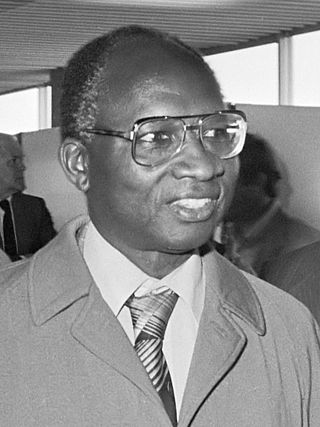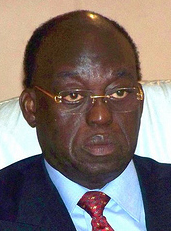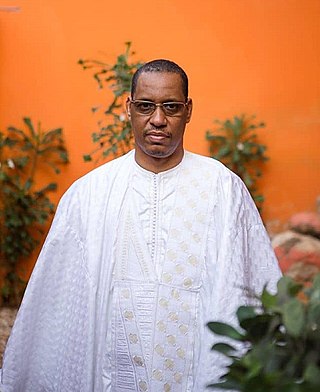Related Research Articles

Senegal, officially the Republic of Senegal, is a country in West Africa, on the Atlantic Ocean coastline. Senegal is bordered by Mauritania to the north, Mali to the east, Guinea to the southeast and Guinea-Bissau to the southwest. Senegal nearly surrounds the Gambia, a country occupying a narrow sliver of land along the banks of the Gambia River, which separates Senegal's southern region of Casamance from the rest of the country. Senegal also shares a maritime border with Cape Verde. Senegal's economic and political capital is Dakar.

Politics in Senegal takes place within the framework of a presidential democratic republic. The President of Senegal is the head of state and government. Executive power in Senegal is concentrated in the president's hands.

Senegal's first President, Léopold Senghor, advocated close relations with France and negotiation and compromise as the best means of resolving international differences after Senegal's independence from its status as a French colony. To a large extent, the two succeeding presidents, Abdou Diouf and Abdoulaye Wade, have carried on Senghor's policies and philosophies. Senegal has long supported functional integration among French-speaking West African states through the West African Economic and Monetary Union.

Sir Dawda Kairaba Jawara was a Gambian politician who served as Prime Minister from 1962 to 1970, and then as the first President of the Gambia from 1970 to 1994.

Abdou Diouf is a Senegalese politician who was the second President of Senegal, in office from January 1981 to April 2000.

Cheikh Tidiane Gadio is a Pan African political figure and diplomat who has held prominent positions on the African continent over the last two decades. He served as a special envoy on matters of conflict prevention and resolution in Africa, including Special Envoy of the Organisation Internationale de la Francophonie (OIF) to Mali, Special Envoy for the Organisation of Islamic Cooperation (OIC) for the Central African Republique, and Special Representative for Africa for the Secretary General of OIC.

Senegambia, officially the Senegambia Confederation or Confederation of Senegambia, was a loose confederation in the late 20th century between the West African countries of Senegal and its neighbour the Gambia, which is almost completely surrounded by Senegal. The confederation was founded on 1 February 1982 following an agreement between the two countries signed on 12 December 1981. It was intended to promote cooperation between the two countries, but was dissolved by Senegal on 30 September 1989 after the Gambia refused to move closer toward union. The Senegambia Confederation should not be confused with the historic Senegambia region, generally shortened to the Senegambia.
The Socialist Party of Senegal is a political party in Senegal. It was the ruling party in Senegal from independence in 1960 until 2000. In the 2000 presidential election, the party's candidate and previous incumbent, Abdou Diof, was defeated by the leader of the Senegalese Democratic Party, Abdoulaye Wade. Ousmane Tanor Dieng has been the First Secretary of the party since 1996 and was the presidential candidate in 2007 and 2012. The best-known figure of the Socialist Party was Léopold Sédar Senghor, the first President of Senegal.

Moustapha Niasse is a Senegalese politician and diplomat who has been President of the National Assembly from 2012 until 2022. He served in the government of Senegal as Foreign Minister of Senegal from 1978 to 1984 and again from 1993 to 1998. He was Prime Minister of Senegal for a few weeks in 1983, and he held that position again from 2000 to 2001.
Father Augustin Diamacoune Senghor was a Catholic priest and a leading figure in the Casamance independence movement from Senegal. He served as director of the Saint-Louis of Ziguinchor Seminary from 1972 until 1975.

Abdoulaye Bathily is a Senegalese politician and diplomat. Bathily, the long-time Secretary-General of the Democratic League/Movement for the Labour Party (LD/MPT), served in the government of Senegal as Minister of the Environment from 1993 to 1998 and as Minister of Energy from 2000 to 2001. Later, he worked as a diplomat for the United Nations, and since 2014 he has been Special Representative of the United Nations Secretary-General for Central Africa.
Djibo Leyti Kâ was a Senegalese politician and the Secretary-General of the Union for Democratic Renewal (URD). He was a prominent minister under President Abdou Diouf from 1981 to 1995 and founded the URD in 1998 after splitting from Diouf's Socialist Party (PS). From 2004 to 2012, he again served in the government under President Abdoulaye Wade, initially as Minister of State for Maritime Economy and then as Minister of State for the Environment beginning in 2007. Man of the state, he then was appointed Minister under Macky Sall's government before becoming the Director of the CNDT.
Iba Der Thiam, also known as I. D. Thiam, was a Senegalese writer, historian, and politician. He served in the government of Senegal as Minister of Education from 1983 to 1988; later, he was First Vice-President of the National Assembly of Senegal from 2001 to 2012.
Diouf, or "Joof" is a Serer surname carried by several personalities :

Fatma Samba Diouf Samoura is a Senegalese former diplomat and senior executive. She was appointed as the first female Secretary General of FIFA by President Gianni Infantino on 13 May 2016 and assumed her post on 20 June 2016. Previously she worked in various positions at the United Nations. In 2018, Forbes ranked her Number 1 in their Most Powerful Women in International Sports list, and the BBC listed her as one of their 100 women.

Joof or Diouf is a surname that is typically Serer. This surname is also spelt Juuf or Juf.

Cheikh Bamba Dieye is a Senegalese politician who has served in the government of Senegal as Minister of Regional Planning and Local Government since April 2012. Previously he was Mayor of Saint-Louis, Senegal, as well as a Deputy in the National Assembly of Senegal; he was also a candidate in the 2012 presidential election. Cheikh Bamba Dièye is a member of the political party Front for Socialism and Democracy/Benno Jubël.

Aminata Mbengue Ndiaye is a Senegalese politician. In 2012, she was appointed Minister of Livestock and Animal Production in the government of Prime Minister Abdou Mbaye and from 2014 under the government of Prime Minister Mahammad Boun Abdallah Dionne until 5 April 2019, when she was named Minister of Fishery and Maritime Economy Ministre des Pêches et de l’Economie maritime. She also serves as mayor of Louga, and is currently chair of the women's movement of the Socialist Party of Senegal. Previously, Ndiaye served as Minister of Women, Children and the Family, as well as Minister of Social Development and National Solidarity under the presidency of Abdou Diouf.
The Dakar Conference was a historic conference between members of the Institute for Democratic Alternatives in South Africa (IDASA) and the African National Congress (ANC). It was held in Dakar, Senegal between 9 and 12 July 1987. The conference discussed topics such as strategies for bringing fundamental change in South Africa, national unity, structures of the government and the future of the economy in a free South Africa. The IDASA delegation from South Africa, participated in the conference in their private capacity and would later be condemned by the South African government for meeting a banned organization. The future indirect result of the conference was South African government talks with Nelson Mandela and his eventual meeting with P. W. Botha in 1989.

Cherif Mohamed Aly Aidara is a Senegalese-Mauritanian Shia religious leader who is known for his work on international development in West Africa. He is one of the primary Shia religious figures in Senegal and West Africa.
References
- ↑ "List of Members of the Pan African Parliament" (PDF). Africa Union. 15 March 2004. Archived from the original (PDF) on 18 May 2011. Retrieved 27 October 2010.